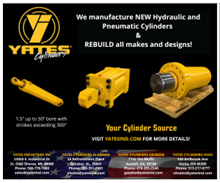Ryerson Reports Record Earnings Per Share for 2005
02/17/2006 -
Feb. 17, 2006 — Ryerson Inc. reported income from continuing operations of $12.3 million on sales of $1.3 billion for the fourth quarter, and income from continuing operations of $104.2 million on sales of $5.8 billion for the full year ended December 31, 2005.
Fourth Quarter Results—The $12.3 million income from continuing operations ($0.47 per diluted share) compares with net income of $260,000 ($0.01 per diluted share) for the fourth quarter of 2004.
Results included a $3.1 million ($0.07 per share) reduction in gross profit related to the company’s change to a uniform LIFO inventory accounting method; a $4.4 million pretax ($0.10 per share) favorable adjustment to cost of goods sold to record stainless nickel surcharges in Canada; a pretax restructuring charge of $0.7 million ($0.02 per share); and a $1.7 million ($0.06 per share) favorable tax adjustment. Fourth quarter 2004 results included a $0.9 million ($0.02 per share) pretax gain on the sale of assets; and a $1.9 million ($0.07 per share) income tax benefit, attributed to the reassessment of the valuation allowance for a deferred tax asset.
Sales of $1.3 billion reflect a 44.4% increase from the fourth quarter of 2004, due to the acquisition of Integris Sales also reflect a 7.8% decline, sequentially, from the third quarter of 2005, primarily due to fewer shipment days. Tons shipped increased 17.8%, and the average selling price increased 22.7%, year-over-year. Sequentially, tons shipped declined 7.2%, or 1.0% on a per-day basis, reflecting normal seasonal slowness, while the average selling price per ton declined 0.7% from the third quarter of 2005.
Gross profit per ton was $271, including a $5 per ton benefit related to the nickel surcharge adjustment, compared to $182 in the fourth quarter of 2004 and $267 in the third quarter of 2005. Gross margins of 17.0% compared with 14.0% in the fourth quarter of 2004 and 16.7% in the third quarter of 2005.
Operating expenses per ton were $232, compared with $190 in the third quarter of 2005 and $175 in the year-ago period. Third quarter 2005 expense per ton of $190 included a $31 per ton benefit from the pension curtailment gain and gain on sale of assets. Year-over-year gross profit and operating expense comparisons were significantly affected by the inclusion of Integris in 2005.
Interest expense was $16.3 million, compared with $19.9 million in the third quarter of 2005 and $7.8 million in the fourth quarter of 2004. The year-over-year increase reflects debt used to fund the acquisition of Integris Metals and higher working capital requirements. The sequential decline is the result of the company's reduction of debt levels.
Comparing the fourth quarter of 2005 with pro forma fourth quarter 2004 — which assumes that the acquisitions of J&F Steel and Integris Metals had occurred on January 1, 2004 — net sales declined 7.8%, year-over-year, on a 4.5% decline in tonnage. The fourth quarter of 2005 operating profit of $31.9 million compared favorably to pro forma operating profit of $26.7 million in the fourth quarter of 2004.
Fiscal Year Results—The $104.2 million income from continuing operations of ($4.01 per diluted share) compares with income of $47.4 million ($1.84 per diluted share) for 2004.
Results included a one-time reduction in gross profit of $9.6 million ($0.22 per share) related to the company’s change to a uniform LIFO inventory accounting method; a $5.0 million pretax ($0.11 per share) favorable adjustment to cost of goods sold, to correct the stainless nickel surcharges reflected in inventory in Canada; and a pretax pension curtailment gain of $21.0 million ($0.49 per share) on freezing Integris Metal's non-union plan. Additional adjustments included a pretax gain of $6.6 million ($0.15 per share) on the sale of property; a pretax restructuring charge of $4.0 million ($0.09 per share); and a $2.1 million ($0.08 per share) net favorable income tax adjustment.
Sales increased 75.1% to $5.8 billion on a 24.0% increase in tons shipped and a 41.2% increase in the average selling price per ton. Gross profit per ton expanded to $280 in 2005, compared to $200 in 2004. Operating expenses per ton were $212, compared to $166 in 2004. On a pro forma basis, net sales increased 6.9%, and operating profit grew 13.6% in 2005.
Results in 2004 included a pretax restructuring charge of $3.6 million ($0.08 per share); a pretax gain of $5.6 million ($0.13 per share) on the sale of assets; and an income tax benefit $1.9 million ($0.07 per share) attributable to the reassessment of the valuation allowance for a deferred tax asset.
Management Comments—"Our record 2005 results reflect our success integrating Integris Metals, acquired in January 2005, and strong market conditions, despite declining prices during 2005 from year-end 2004 levels," said Neil S. Novich, Chairman, President, and CEO of Ryerson. "In 2005, we achieved integration cost savings of approximately $12.5 million and annualized cost savings of $16 million, at a year-end run rate. And our strong operating cash flow of $320 million enabled us to make excellent progress reducing debt levels."
Financial Condition—In the fourth quarter of 2005, Ryerson generated cash flow from operations of $192.6 million, including a $112.7 million seasonal reduction in accounts receivable and a $60.3 million reduction in inventory. As a result, the company reduced debt by $205.5 million during the quarter, ending the year with a debt-to-capital ratio of 61.5%, compared to 67.2% at the end of the third quarter of 2005. Availability under its credit facility increased to $575 million at the end of 2005, up from $409 million at the end of the third quarter.
During 2005, Ryerson reduced debt from $1.18 billion at the close of the Integris acquisition, on January 4, 2005, to $877 million at year-end 2005, primarily due to its strong operating results and inventory reductions.
On February 6, 2006, Ryerson announced the signing of a definitive agreement to sell certain assets related to the oil and gas, tubular alloy, and bar alloy businesses to Energy Alloys, LLC. While this $80 million revenue business is profitable, it is not a strategic fit with Ryerson's core business in the U.S. The sale price includes $45.5 million of cash; receipt of a $4 million, 3-year note; and the assumption of less than $1 million of liabilities by Energy Alloys. The company expects to use the cash proceeds from the sale, which it plans to complete in the first quarter of 2006, to pay down debt. The sale is expected to generate a pretax gain of approximately $18 million.
On January 31, 2006, the collective bargaining contract for Ryerson's Chicago facilities expired. While the members provided their union with authorization to strike, Ryerson and the union continue to negotiate and work toward a settlement. The affected locations accounted for approximately 10% of Ryerson's sales in 2005.
Outlook—"In 2006, to date, overall pricing, daily volume rates, expenses per ton, and margins remain comparable to the fourth quarter of 2005," concluded Novich. “Additionally, as previously discussed, completion of the Integris Metals integration is expected to include restructuring charges of $7 million to $11 million, as well as operating expenses — primarily for physical relocation of equipment and inventory — of $5 million to $8 million. Most of these expenses are likely to occur in 2006.
"We will continue to implement our integration plan, with the goal of achieving $50 million of annualized cost savings — a majority in 2006 and the remainder in 2007. We also expect to continue to improve our debt-to-capital ratio over the course of the year."
In November 2004, the company issued $175 million of convertible notes. There will be an impact on diluted earnings per share any time the stock price for a quarter averages more than the conversion price of $21.37. During 2005, there was no dilutive effect.
Ryerson Inc. is a leading North American distributor and processor of metals, with 2005 revenues of $5.8 billion. The company services customers through a network of service centers across the United States and in Canada, Mexico, and India. On January 1, 2006, the company changed its name from Ryerson Tull, Inc. to Ryerson Inc.



.jpg?lang=en-US&ext=.jpg)
.gif?width=220&height=200&mediaprotectionhash=374c6b9a31f2b2fbfc7937391034efb46fd57feba997b9ad2ae9a0bd3d48329d&ext=.gif)

.gif?width=100&height=200&mediaprotectionhash=e2d5b15d68f84f22038524be6c58e5268d67b7f44494b544e29a8d53c5b959ba&ext=.gif)
